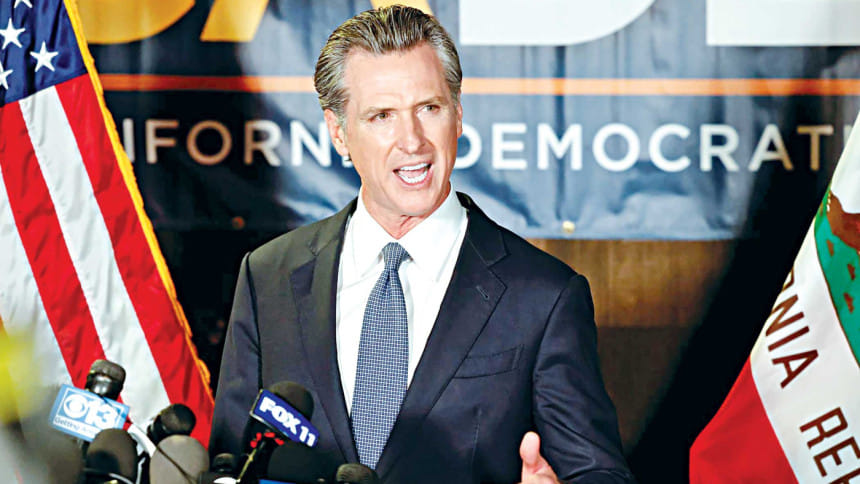The great ‘tamasha’ of California recall election

It was a political circus almost as outsized as America's largest state: California.
This was a recall election where the result should have been a foregone conclusion—and in the end, it was. California Governor Gavin Newsom, a Democrat, ran a robust campaign to turn the election into a cakewalk in this overwhelmingly Democratic state.
But not before he spent some sleepless nights, and the state went through the sort of drama that would make a soap opera screenwriter blush.
First, let's have a quick primer on that odd political confection: the California recall system. A legacy of the progressive tradition of direct democracy, California has a relatively low threshold of petitioners that can trigger a vote to recall a governor.
A lofty idea, perhaps, but it has more holes than a piece of Swiss cheese. Take this year's gubernatorial recall election. A voter had to make two choices. The first was whether you want to recall (read "sack") the current governor. If you don't, then the governor gets to keep his job. End of story.
But if you do, then things get weird. In that case, anyone who wins a plurality among a colourful assortment of candidates—this year there were 46—wins. I am not joking. So hypothetically, even if 49 percent voters vote for keeping the governor (which means 51 percent don't and he/she has to go), anybody among her/his opponents with a plurality—Newsom's opponent Larry Elder won 38 percent at last count—gets to oust him.
Another wrinkle in the mix—which gave the Democrats a real fright this time around—is that a recall election is often a one-off effort with very low turnout. Important Democratic constituents like the minorities and young people are notoriously inconsistent voters.
In the end, however, the Republican-fevered dreams never did pan out—to nobody's surprise. But before I elaborate on that, let's take a quick recap on how this recall circus came about.
Like most of the awful things that are happening around the world during this terrible time, it was the pandemic that almost cost Newsom his job. California was hit hard by the pandemic, and Newsom's tough restrictive mandates made many voters chafe. What's worse, while he imposed draconian restrictions, he was caught schmoozing—maskless—in a party in one of the most expensive restaurants in California named French Laundry (I'm still scratching my head about that name).
Angry voters organised, and conservative media and the Republican Party were only too happy to egg them on.
At first glance, you may be wondering: What on earth were Republicans thinking? In California, Democrats outnumber Republicans by a margin of 2-1; Democrats have a supermajority in the legislature, and the last time Republicans won a statewide race was over a decade ago. President Joe Biden trounced former President Donald Trump last year by a whopping 29 points.
Republicans likely wistfully looked back at the last time California tried to recall a governor and succeeded. In 2003, just like in one of his "Terminator" movies, macho movie star Arnold Schwarzenegger appeared to come out of nowhere and beat sitting Democratic Governor Gray Davis.
Things have changed since then. The state is far more Democratic, and while Davis was very unpopular, Newsom is not. The key difference, however, is the diametrically opposite political strategy to unseat the governor. In 2003, Schwarzenegger hewed to a moderate, localised political message—his focus was on a widely loathed vehicle tax. (The fact that he was a celebrity didn't hurt—this is, after all, the land of Hollywood.)
The Republican strategy this time around was the exact opposite—with catastrophic electoral results. Their frontrunner, conservative radio talk show host Larry Elder, is a hardcore unabashed Trump-like candidate who basks in riling up the base: a doomed strategy in a state where Republicans are so outnumbered.
CNN reports that Elder has said that "the ideal minimum wage is USD 0.00." He once called climate change "a crock," argued slave owners should receive reparations, and opposed mandating masks or vaccines during the Covid-19 pandemic. He has also written that "women know less than men." Good luck winning California with that.
Yet, the fact of the matter is that in the summer, polls did show that the recall vote could be close. Newsom hauled in a torrent of campaign cash and simply drowned the airwaves. Republicans, for all the noise they made, failed to convince donors with deep pockets to back them.
There is also a rather Trumpian twist in all this. The former president continues to cast a long shadow on the party, which is utterly in thrall with his brand of toxic, take-no-prisoners, own-the-libs politics. In California, that's poison.
Elder helped Newsom frame the election as a choice between him and a Trump clone that helped galvanise Democratic voters. The lopsided Democratic advantage did the rest.
In the end, voters backed Newsom for stoutly defending robust measures to battle Covid-19. More than 67,000 Californians have died in the pandemic, and despite the Republican attacks, Newsom has stood firm, and California has one of the nation's highest vaccination rates and lowest rate of new virus cases.
"It appears that we are enjoying an overwhelmingly 'no' vote tonight here in the state of California, but 'no' is not the only thing that was expressed tonight," a jubilant Newsom told reporters on September 14.
"We said yes to science. We said yes to vaccines. We said yes to ending this pandemic. We said yes to people's right to vote without fear of fake fraud and voter suppression. We said yes to women's fundamental constitutional right to decide for herself what she does with her body, her fate, her future. We said yes to diversity."
Ashfaque Swapan is a writer and editor based in Atlanta, US.

 For all latest news, follow The Daily Star's Google News channel.
For all latest news, follow The Daily Star's Google News channel. 



Comments